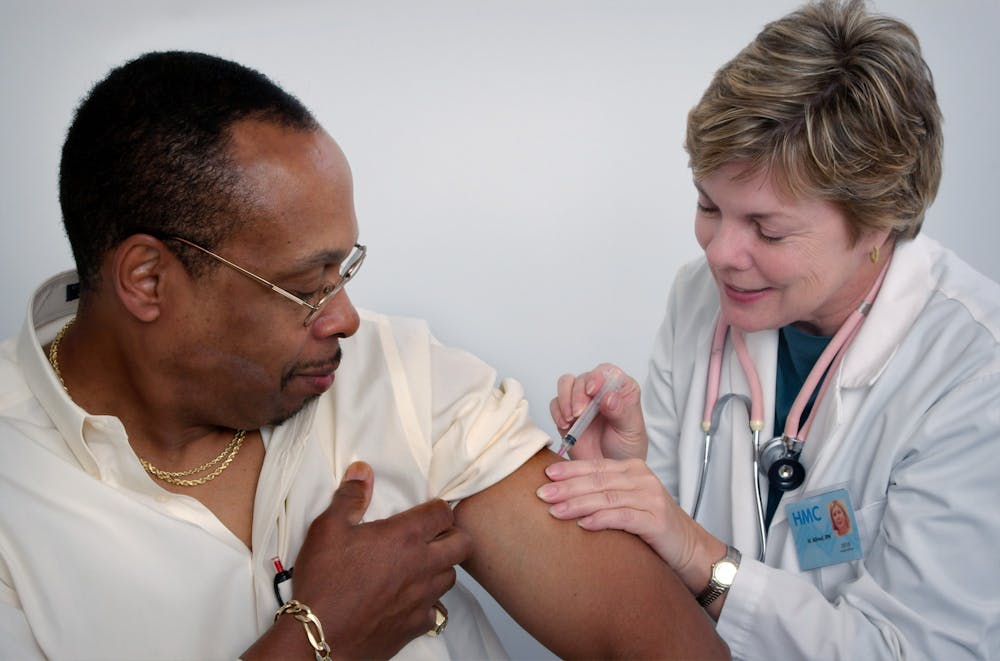U.S. health officials are bracing for a potential perfect storm as the flu season begins amidst the COVID-19 pandemic.
Each year influenza, or the common flu, poses a large burden on the health care system. Within the last year, New Mexico has seen several hundred deaths due to the flu. The state’s mortality rates follow closely with national mortality rates, according to the Centers for Disease Control and Prevention.
The University of New Mexico Hospital is operating at critical levels, “well above the 85% average capacity threshold considered optimal for hospital efficiency,” according to a UNMH report. A heavy flu season could stagger hospitals already dealing with COVID cases, as both respiratory viral infections can require intensive care treatment.
Furthermore, health officials are also unsure about the implications of coinfection — testing positive for both COVID-19 and the flu.
Infectious disease physician and UNMH epidemiologist Dr. Meghan Brett mentioned the ongoing development of an effective respiratory test that can determine if an individual is coinfected; however, the health implications of such an infection are still unknown.
Officials are still unsure of what degree of severity to expect for New Mexico’s upcoming flu season and are worried that people may not receive their flu vaccination or continue to adhere to social distancing guidelines.
The effective distribution of vaccines has become more challenging under COVID-19 health regulations and with the upcoming holidays. Officials are concerned about an increase in travel and interaction with others.
Brett provided a glimmer of hope, despite the predicted severity of the upcoming flu season.
“(The) measures that we are doing — in terms of social distancing, wearing masks, cleaning things more effectively and washing hands — ended our flu season in New Mexico a month-and-a-half to two months earlier than average,” Brett said.
Countries in the southern hemisphere, which began their flu season in June, reported far lower numbers of influenza cases and other seasonal respiratory viral infections this year, according to the Washington Post. This lower transmission rate is attributed to the stricter containment measures put in place for COVID-19.
Similar effects have already begun to be seen in New Mexico.
During the summer months there is a large influx of rhinovirus and parainfluenza virus cases; however, this year there have been little to no cases, as seen in Infectious Disease reports by Tricore Reference Laboratories.
Get content from The Daily Lobo delivered to your inbox
Furthermore, hospitals have plans in place for a possible surge in the volume of patients with respiratory viruses that need critical care.
"What works for COVID works for the flu,” Brett said.
The robust emergency plan that hospitals had in place for COVID-19 still apply and include continuing to adhere to social distancing guidelines, triaging patients according to need and having back up plans for a potential lack of resources.
“Great work so far in making New Mexico one of the leading states in terms of our COVID response,” Brett said. “Stick with what we have learned that has been effective. Continue wearing masks, think about who you are associating with and try to not expand your social bubble, even during the upcoming holiday season.”
Health officials implored people to get a flu shot, because it can reduce the effects of one of the two potential infections.
UNM offers free flu shots to students, faculty, staff and the public, and encourages everyone to take advantage of the vaccinations.
Drive through clinics are offered every Saturday to the public for individuals six months and older from 9 a.m. to 3 p.m. until Oct. 31 at varying UNM family clinic locations. Main Event UNM Community Walk-Up Clinics will be offered Tuesday, Oct. 20 and Wednesday, Oct. 21 from 11 a.m. to 3 p.m. in the Student Union Building ballrooms for individuals 18 and older.
Students can call 505-277-3136 to schedule an appointment to get a free flu shot from SHAC.
All persons are required to wear a mask, bring their own pen and wear a short sleeved shirt. UNM employees on a University medical plan are required to present their medical plan ID card.
Nikita Jaiswal is a freelance reporter at the Daily Lobo. She can be contacted at news@dailylobo.com or on Twitter @DailyLobo






